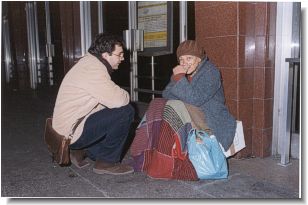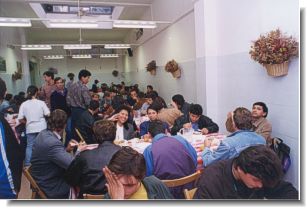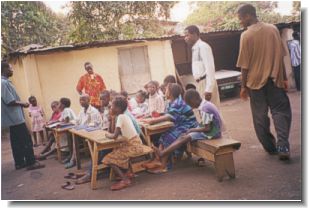|










|
Friendship with poor
people
 The
third "work" typical of Sant'Egidio, fundamental and daily
commitment since the very beginning, is the service to poor people, lived
as friendship. The students of 1968 who began gathering around the Word of
God, felt the Gospel could not be lived far from poor people: poor people
as friends and the Gospel as the Good News for poor people. Thus the first
service of the community began, when it was not yet named Sant'Egidio. It
was called the "People's School" because it was not simply
providing extra tutoring for drop-out children of the slums of Rome (like
the "Cinodromo" shacks along the Tiber), but it was the
beginning of a friendship between the rich and the poor. Since then, the
people's schools multiplied, in Rome and in all the other cities where the
community lives, with special attention to the most disadvantaged
children in the most difficult situation. The
third "work" typical of Sant'Egidio, fundamental and daily
commitment since the very beginning, is the service to poor people, lived
as friendship. The students of 1968 who began gathering around the Word of
God, felt the Gospel could not be lived far from poor people: poor people
as friends and the Gospel as the Good News for poor people. Thus the first
service of the community began, when it was not yet named Sant'Egidio. It
was called the "People's School" because it was not simply
providing extra tutoring for drop-out children of the slums of Rome (like
the "Cinodromo" shacks along the Tiber), but it was the
beginning of a friendship between the rich and the poor. Since then, the
people's schools multiplied, in Rome and in all the other cities where the
community lives, with special attention to the most disadvantaged
children in the most difficult situation.
 In
accordance with chapter 25 of the Gospel of Matthew, this friendship
widened to other poor people: physically and mentally disabled, homeless,
foreign immigrants, terminally ill people; and to different situations:
prisons, homes for old people, gypsy camps, refugee camps. Over the years
a sensitivity towards non-traditional poverty developed, especially in
European countries where, for example, old people remain alone even if they are wealthy. In
accordance with chapter 25 of the Gospel of Matthew, this friendship
widened to other poor people: physically and mentally disabled, homeless,
foreign immigrants, terminally ill people; and to different situations:
prisons, homes for old people, gypsy camps, refugee camps. Over the years
a sensitivity towards non-traditional poverty developed, especially in
European countries where, for example, old people remain alone even if they are wealthy.
Sant'Egidio
identifies with those who are considered the least, considering them as
brothers, with no exclusions. They are fully part of the family of the
community. Wherever there is a community of Sant'Egidio, from Rome to San
Salvador, from Cameroon to Belgium, from Ukraine to Indonesia, friendship
and familiarity with poor people are always at the centre. There is no
community, not even the youngest one, which is so small or weak that
cannot help other poor people. It is the "widow's mite" which has
great value for the Lord (Mk. 12: 41).

|
